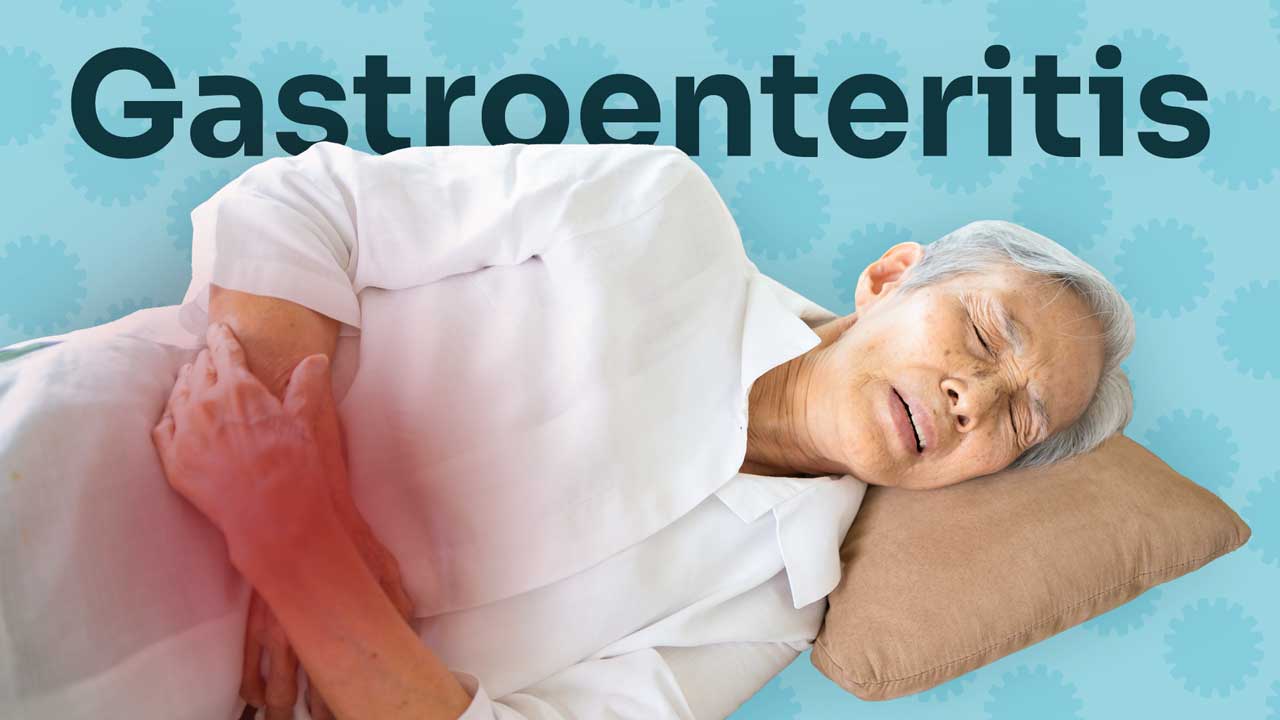Gastroenteritis is a common illness with a variety of causes. It is often highly contagious.
What is Gastroenteritis?
Gastroenteritis is the infection or inflammation of the digestive system. It can be caused by viruses, bacteria, parasites, toxins, chemicals and medicines. There are many kinds of gastroenteritis, most of them contagious (Better Health Channel 2021; Healthy WA 2018).
Symptoms typically include abdominal cramps, vomiting and diarrhoea. Gastroenteritis is a short-term illness that usually resolves by itself after a few days (Better Health Channel 2021).
Causes of Gastroenteritis
There are many causes of gastroenteritis. They include:
- Viruses (e.g. norovirus, rotavirus)
- Bacteria (e.g. salmonella, Campylobacter)
- Parasites (e.g. Cryptospordium, Giardia lamblia)
- Chemicals (e.g. lead poisoning, toxins in poisonous mushrooms)
- Toxins produced by bacteria, which can contaminate food (e.g. Staphylococcus aureus)
- Some medicines can cause gastroenteritis in certain people.
(Better Health Channel 2021; Healthdirect 2023; Healthy WA 2018)
Viruses are the most common cause (Healthdirect 2023. Infections caused by viruses, bacteria and parasites can be contagious (Better Health Channel 2021).
How is Gastroenteritis Spread?
Gastroenteritis is spread through contact with vomit or faeces from an infected person. This can happen easily through:
- Person-to-person contact
- Contaminated objects
- Contaminated food or drink
- Contact with liquid particles when a person vomits.
(NSW Health 2022)

Incubation Period
The time between exposure and onset of symptoms depends on the pathogen a person has been infected with. It can range from one hour to several weeks (Healthy WA 2018).
The contagious period also varies depending on what caused the gastroenteritis, and in some cases, a person can be contagious even after symptoms have stopped (Mayo Clinic 2024).
Symptoms of Gastroenteritis
- Vomiting
- Nausea
- Abdominal pain or cramps
- Diarrhoea
- Loss of appetite
- Bloating
- Fever
- Bloody stools (in some cases)
- Pus in stools (in some cases)
- General lethargy, body aches and feeling unwell.
(Better Health Channel 2021; Healthy WA 2018)
Symptoms generally last 1 to 3 days, but sometimes continue for as long as 10 (Healthdirect 2023).

Gastroenteritis Complications
Gastroenteritis is not usually a serious illness but may lead to dehydration. In severe cases, an individual may require intravenous therapy to replenish lost fluids (Better Health Channel 2021).
Babies under six months old are more susceptible to dehydration and should always receive medical attention (RCHM 2018).
Older people are also at a higher risk of dehydration. Furthermore, gastroenteritis outbreaks within residential care facilities can have devastating effects. For a more in-depth look at investigating and containing gastroenteritis outbreaks in aged care, see Gastroenteritis Outbreak Management In Aged Care.
Who is at Risk?
Gastroenteritis can affect anyone. However, outbreaks are more common in certain group settings. These include:
- Families
- Aged care facilities
- Hospitals
- Childcare centres
- Schools.
(NSW Health 2022)
Treating Gastroenteritis
Most people will recover on their own without complications but should be advised to rest and drink plenty of fluids to stay hydrated. Rehydration fluids may be used (NSW Health 2022).
Medicines should only be used upon recommendation by a health professional (Better Health Channel 2021).

Preventing Gastroenteritis
The best way to avoid contracting gastroenteritis is to perform thorough hand hygiene after using the bathroom or changing nappies, and before preparing food or eating (Healthdirect 2023). Other prevention strategies include:
- Using disposable paper towels to dry hands (bacteria may survive on towels)
- Avoiding cross-contamination while preparing food
- Keeping kitchen surfaces and equipment clean
- Keeping cold food under 5°C and hot food over 60°C
- Ensuring food is thoroughly cooked
- Cleaning toilets and bathrooms (especially handles, taps and toilet seats) regularly
- Washing hands thoroughly after contact with a sick person or cleaning up vomit or faeces
- Using gloves when cleaning up vomit and faeces
- When travelling in developing countries, drinking bottled water and avoiding certain foods (e.g. uncooked food, peeled fruits or vegetables, ice in drinks).
(Better Health Channel 2021; NSW Health 2022)
There is a rotavirus vaccination for babies under six months of age (Healthy WA 2018).
People with gastroenteritis can avoid spreading it to others by:
- Resting at home and not attending work or school until 48 hours after symptoms have resolved
- Avoiding preparing food for others or caring for others until 48 hours after symptoms have resolved
- Washing their hands thoroughly after using the bathroom.
(NSW Health 2022)
Test Your Knowledge
Question 1 of 3
What is the most common cause of gastroenteritis?
Topics
Further your knowledge
References
- Better Health Channel 2021, Gastroenteritis, Victoria State Government, viewed 12 March 2025, https://www.betterhealth.vic.gov.au/health/conditionsandtreatments/gastroenteritis
- Healthdirect 2023, Gastroenteritis, Australian Government, viewed 12 March 2025, https://www.healthdirect.gov.au/gastroenteritis
- Healthy WA 2018, Gastroenteritis, Government of Western Australia, viewed 12 March 2025, https://healthywa.wa.gov.au/Articles/F_I/Gastroenteritis
- Mayo Clinic 2024, Stomach Flu: How Long am I Contagious?, Mayo Clinic, viewed 12 March 2025, https://www.mayoclinic.org/diseases-conditions/viral-gastroenteritis/expert-answers/stomach-flu/faq-20057899
- New South Wales Health 2022, Viral Gastroenteritis Fact Sheet, New South Wales Government, viewed 12 March 2025, https://www.health.nsw.gov.au/Infectious/factsheets/Pages/viral-gastroenteritis.aspx
- The Royal Children’s Hospital Melbourne 2018, Gastroenteritis (Gastro), The Royal Children’s Hospital Melbourne, viewed 16 March 2023, https://www.rch.org.au/kidsinfo/fact_sheets/Gastroenteritis_gastro/
 New
New 

